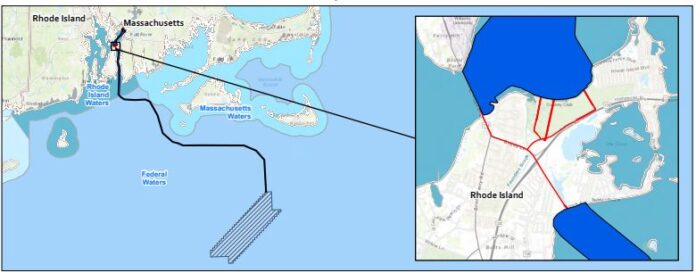
PROVIDENCE – An offshore wind developer wants to run cables up the Sakonnet River and under Aquidneck Island to deliver electricity to Massachusetts’ south coast.
But some coastal Rhode Island towns are worried the project will disrupt residents, hurt fishermen and dissuade tourists from coming to their town. And they are going to get more say in the review process under power granted by state regulators on Tuesday.
The R.I. Energy Facility Siting Board’s unanimous vote gives Middletown and Little Compton limited intervention to speak and submit written comments about how Mayflower Wind Energy’s cable burial plan will affect their economies. Portsmouth is also granted intervention status automatically, since the cables will run directly beneath the town.
The offshore wind farm slated for federal waters between Martha’s Vineyard and Nantucket is expected to bring a massive 2,400 megawatts of wind power to Massachusetts through connections in Somerset and Falmouth. To reach the transmission point in Somerset’s Brayton Point, the developers have proposed running high-voltage power lines from the wind farm up the Sakonnet River, through Portsmouth and out Mount Hope Bay.
The cable burial plan covers 139 acres – about 105 football fields – of Rhode Island water and land, and requires approval from the R.I. Energy Facility Siting Board. The board will make its decision based on criteria that includes economic benefits, environmental impacts and whether the project meets the state’s energy needs at a reasonable cost to consumers, according to state law.
Mayflower Wind in a 450-page application described the project as a way to help meet the state’s ambitious renewable energy goals, while also stimulating the local economy. The entire project – not just the cable component – is expected to create nearly 14,800 jobs in the region, although how many would be in Rhode Island, and how many are specific to the cable burial, was not available.
Portsmouth will get tax revenue from the 2-mile, underground cables that would run northwest through the town, although the amount was not available.
Mayflower Wind has also signed an agreement with the R.I. Commerce Corp. to participate in its SupplyRI program, meaning it will buy goods from and contract with Rhode Island businesses for its offshore wind project.
The board’s final decision is at least six months away based on the timeline for advisory opinions to come in from other agencies, according to Emma Rodvien, the board’s coordinator. Already, coastal communities are forecasting how the project, if approved, could change their way of life.
Portsmouth, as the “host town” through which the cables will traverse, is automatically guaranteed the right to review the burial plan as a formal intervenor in the case. But two other towns, Middletown and Little Compton, want the same power.
In written filings, Marisa Desautel, the attorney representing Little Compton and Middletown, said the undersea cable burials could hurt town views, water access and boat navigation, along with recreational and commercial fishing.
Mayflower Wind in its application acknowledged that there might be “temporary displacement” of wildlife and “potential impacts to commercial and recreational fisheries” during construction and subsequent operations.
However, Christian Capizzo, the attorney with Partridge, Snow & Hahn LLP representing Mayflower Wind, said in written filings this did not give Middletown or Little Compton the right to intervene in the case. Capizzo pointed out that other regulators, such as the R.I. Department of Environmental Management and the R.I. Coastal Resource Management Council, will examine these topics as part of their upcoming approvals. The construction is also timed to avoid summer tourism, with the build-out of the undersea and underground cables scheduled for winter months during 2024-2027, according to the application.
The cables would be buried using a technique known as horizontal directional drilling, which minimizes environmental and ecological damage, the application stated. The same technique is being used by developers of the Revolution Wind project, and avoids the problems of the Block Island Wind Farm, where underwater cables resurfaced, according to Jennifer Flood, permitting director for Mayflower Wind.
Flood in an emailed response on Tuesday said the developer will proceed with the project as planned regardless of which towns are granted intervenor status.
Desautel said the towns “look forward to a cooperative process with the developer in the ESFB.”
“It is the duty of Middletown and Little Compton to protect its shorelines and constituents’ interests,” Desautel said in an emailed statement. “These projects are of first impression at the local level and the municipalities are interested in learning more and being a part of the regulatory process.”
The board also voted Tuesday to request advisory opinions from 10 state and local agencies, which will be asked to weigh in on the environmental, economic and health aspects of the project, among other topics. These advisory groups will have six months to submit their recommendations to the board, which will then begin its final review and approval of the application, Rodvien said.
There will also be a public hearing in Portsmouth prior to the final review, Rodvien said.
Mayflower Wind is a joint venture between Shell New Energies US LLC and Ocean Winds North America.
Kevin Gavin, Portsmouth’s town solicitor, did not return inquiries for comment.
(Updates: Updates throughout from Tuesday’s meeting and reaction from Marisa Desautel.)
Nancy Lavin is a PBN staff writer. You may reach her at Lavin@PBN.com.











